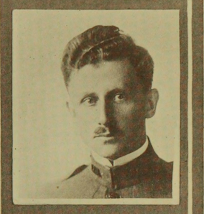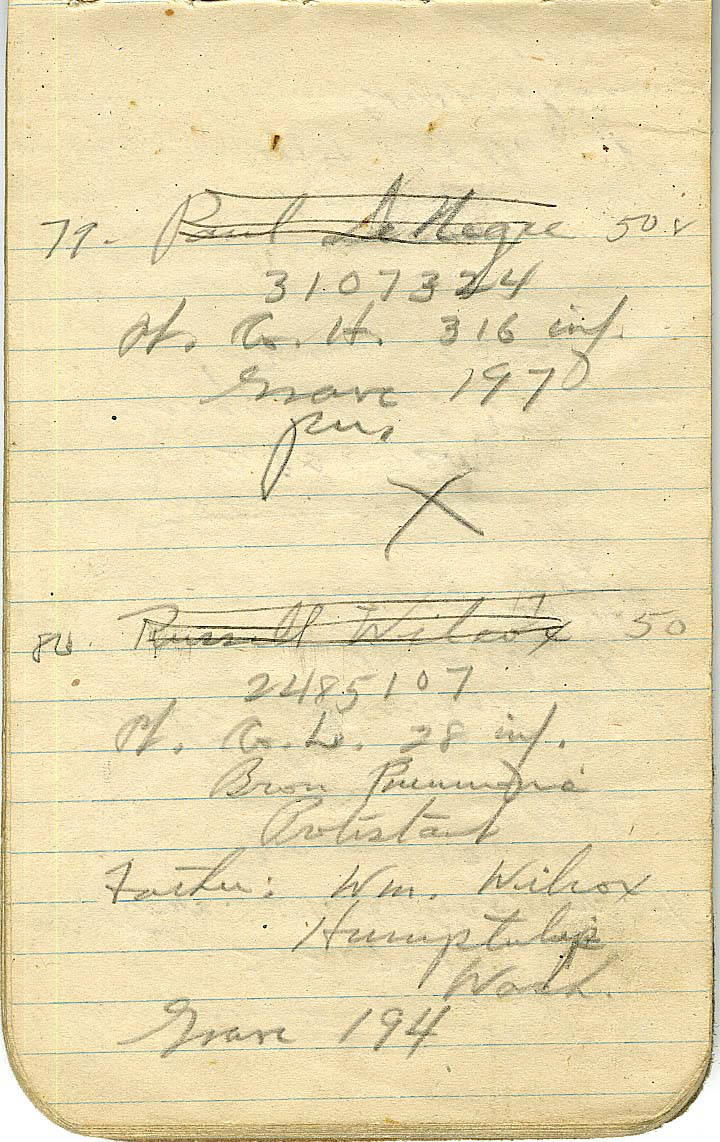The U.S. Army Chaplain Corps was
officially authorized on July 29, 1775, and 2025 marks the 250th anniversary of
the Corps. In honor of this milestone, we celebrate the legacies of Rev. Hansen Bergen and Father William Carroll, CSsR, who served as chaplains with
Base Hospital 50 in Mesves, France, from August 1918-January 1919.
 |
| Father William M. Carroll, CSsR |
"Priests Asked to Volunteer"
In addition to the medical staff, nurses, and enlisted men of Base Hospital 50, many of whom were from the greater Pacific Northwest region, two chaplains were also assigned to the unit: one Protestant and one Catholic;
Reverend Hansen Bergen, a Presbyterian minister, and Father William Carroll, a Redemptorist priest.
When the United States officially entered the Great War, the country did not even have a standing Army. As a result, as the Army and other military branches began developing their fighting forces, they also realized that considerable support personnel were needed, including chaplains. Chaplains had been part of America’s military since the Revolution; however, before World War I, they were appointed to individual regiments and not organized as a specific corps.
In 1917, Congress appropriated more than $1,000,000 for the recruitment of clergy for the armed forces. Men younger than 40 and in good health were sought. Successful candidates were to be paid $2,200/year for overseas duty. Fr. Carroll, at 45, was older than the recruiting parameters, but may have been selected because he met other criteria.
The
Right Reverend Patrick J. Hayes, D.D. (later Archbishop of New York), was tasked with recruiting hundreds of priests as commissioned officers or chaplains to serve during World War I. Although commissioned as first lieutenants, chaplains wore Latin crosses in place of rank insignia to appear less militaristic in the hopes of establishing a better rapport with the enlisted men. The Army estimated upwards of 40% of its soldiers were Catholic and set out to recruit over 500 priests. Local dioceses were advised to release priests for Army service. One such priest to answer Bishop Hayes' (and the nation's) call was Father William Carroll, then a parish priest at
Most Holy Redeemer Parish in Detroit.
Irish-born Fr. Carroll was a Redemptorist priest who had immigrated to the United States in 1896. The oldest child of John Carroll, a clerk, and his wife, Ellen Ahern, who were married in County Limerick, Ireland, on February 3, 1871, William Martin Carroll was born on November 8, 1872, on Pennywell Street, in the city of Limerick. The following day, William was baptized at St. John's Cathedral just a few short blocks away. William was followed by siblings Mary Catherine (known as Mary Kate; 1874), Ellen (1878), and Edward Joseph (1880). John Carroll's occupation was recorded as a draper in subsequent birth records.
The origins of Fr. Carroll's vocation are unknown, but he benefited from an extensive education before entering the priesthood, despite his family's modest background. Personnel records note that he was educated at the Christian Brothers' School and High School, as well as Mungret College in Limerick, and later attended Maynooth Seminary, which was then part of the Royal University in Dublin.
In 1896, at the age of 23, William Carroll left Ireland bound for the New World, arriving in New York City on the
RMS Lucania on August 22, 1896. The ship's passenger manifest does not note his intended destination following his arrival, but Redemptorist records indicate he began receiving theological training at the Redemptorist Seminary in Kirkwood, Missouri, soon after his arrival.

Officially named the
Congregation of the Most Holy Redeemer (
Congregatio Sanctissimi Redemptoris, abbreviated CSsR), the Redemptorist order was founded in 1732 by St. Alphonsus Liguori to work among the poor and abandoned in the mountains of Southern Italy. Members of the Redemptorist order began ministering in Ireland in 1851, beginning at St. John’s Cathedral in Limerick. Primarily a missionary order, the Redemptorists focus on preaching the Gospel, especially to the poor, and are known for their special devotion to
Our Mother of Perpetual Help. The original icon was entrusted to the order's care by Pope Pius X in 1865.
Perhaps Fr. Carroll's early exposure to Redemptorist fathers inspired his interest in the priesthood. He began his studies as a novitiate under
Father Augustine Ahlert until he was transferred to the seminaries at Rock Church (St. Alphonsus Liguori Catholic Church, St. Louis) and De Soto, Missouri. Having received some seminary training in Ireland, William was not required to complete the full course of studies, and he made his profession on October 15, 1897. The Redemptorists have been present in North America since 1832 and were well-established by the time William Carroll was ordained on July 25, 1900, by fellow Irishman Archbishop (and later Cardinal)
John J. Glennon in Kansas City, Missouri. Fr. Carroll said his first Mass there at the seminary in Kansas City.

Fr. Carroll, Kansas City, 1897 |
Following his ordination, Fr. Carroll began a productive and well-traveled career. Over the next eighteen years, Fr. Carroll was posted to parishes in Denver, Colorado; Fresno, California; Kirkwood, Missouri; St. Louis, Missouri; and New Orleans, Louisiana. He coordinated building projects, delivered commencement addresses, advised young women to "look before you leap" when considering marriage, officiated at Knights of Columbus breakfasts, and performed a variety of other pastoral duties, including saying Mass, hearing confessions, visiting the sick, and more.
When the recruitment of priests to serve as chaplains began, Fr. Carroll was released from his duties as a parish priest in Detroit. Upon enlisting, Fr. Carroll initially served as a chaplain for three months with the Knights of Columbus at
Kelly Field, one of thirty-two Air Service training camps established during World War I. Following his commission as First Lieutenant on August 1, 1918, at Detroit, Michigan, he was assigned to serve as a chaplain with Base Hospital 50. He departed for Europe with a group of Casuals aboard the
France on August 25, 1918. (Casuals were soldiers temporarily unattached to a specific unit.) Fr. Carroll's emergency contact was listed as Rev.
Christopher McEnniry, superior of the Redemptorists' St. Louis province in 1918. Coincidentally, Base Hospital 50's
nursing staff traveled to Europe on the same troop transport as Fr. Carroll.
 |
| Fr. Carroll, Mesves, France, ca. 1918 |
 |
| Fr. Carroll, BH50 Reunion, Seattle, 1937 |
From the time he arrived at the Mesves Hospital Center, Fr. Carroll and his fellow chaplain, Rev. Bergen, were responsible for leading worship services, administering sacraments, and performing religious rituals, including bedside prayers and end-of-life ceremonies, balancing the diverse religious needs of the patients and hospital personnel. Chaplains provided spiritual and emotional support to patients and staff, offering counseling and a calming presence during a time of tremendous stress.
The two chaplains officiated at the funerals of soldiers, prisoners of war, and staff who died at the hospital center, carefully recording their names, service numbers, and burial locations so they could be accounted for to the Army's Quartermaster Corps. Certainly, presiding over the funerals of the
five members of Base Hospital 50 who died while serving in France must have been among the more challenging duties the chaplains faced. Following the war, the bodies of those buried at the hospital center's temporary cemeteries were exhumed and reburied in one of the
eight newly created cemeteries for America's war dead, or, if their families preferred, their
remains were repatriated to the United States.
Following the Armistice on November 11, 1918, Fr. Carroll served with Base Hospital 50 until it was formally disbanded in January of 1919. He continued to serve in France with the Army's Services of Supply (SOS) division until he was discharged at Camp Dix, New Jersey, on August 1, 1919. In his portrait above, taken after the war had ended, Fr. Carroll has an Advanced Sector patch (part of the SOS) on his uniform and two six-month service stripes on his sleeve.
Following his return from active duty, Fr. Carroll resumed his busy ministry, with postings in Denver and New Orleans. In 1925, while serving in Kansas City, Fr. Carroll celebrated the 25th anniversary of his ordination. The celebration was attended by fellow clergy who had been present at his first Mass. In addition to his clerical responsibilities, Fr. Carroll became a member of the American Legion, a veterans' organization authorized by Congress in 1919.
After the war, like Fr. Carroll, the staff of Base Hospital also returned to their pre-war daily lives. They held a reunion every year, however, on Armistice Day, November 11, to reminisce and reconnect. Fr. Carroll, far away, was not able to attend these gatherings until 1937, when the invitation to the annual reunion noted the opportunity to "meet again our beloved Chaplain, Father Carroll, who is coming from New Orleans just to see the old gang." By this time, Fr. Carroll had been quietly retired due to declining health. He may have been gassed or suffered a bout of pneumonia during the influenza pandemic, but Fr. Carroll developed lung problems and began declining sometime after his Army service.
The trip from New Orleans to Seattle was so arduous for Fr. Carroll that immediately upon his arrival in Seattle, he was whisked to a local hospital. "With a twinkle in his eye," Fr. Carroll joked "it was an excuse to put him in a good central place where they could pop in and talk to him." Whether it was a ploy or not, their "principal guest" received a steady stream of visitors from his former compatriots. As he reminisced about his wartime service, Fr. Carroll stated:
All of the men and women at Base Hospital 50 did a marvelous job. The hospital was a series of wooden shacks with tar-paper roofs. It rained all the time. It was cold. The roofs leaked. The doctors and nurses had an eternal fight to keeps things antiseptic and to handle the thousands of cases which came to them. But they did things. I have never had a chance to attend one of the reunions before and I am very happy to be here.
Sadly, Fr. Carroll wouldn't get another opportunity to attend one of Base Hospital 50's reunions. Just over a year later, on December 2, 1938, Fr. Carroll died of chronic myocarditis and nephritis at Mercy Hospital in New Orleans at the age of 66. He was buried at the Redemptorist Cemetery in nearby Lacombe, Louisiana. In addition to his life of service, Fr. Carroll was remembered for the kindness he extended to the many soldiers he consoled, whether American, French, or German.
Requiem aeternam dona eis, Domine, et lux perpetua luceat eis.
Eternal rest grant unto him, O Lord, and let perpetual light shine upon him.













